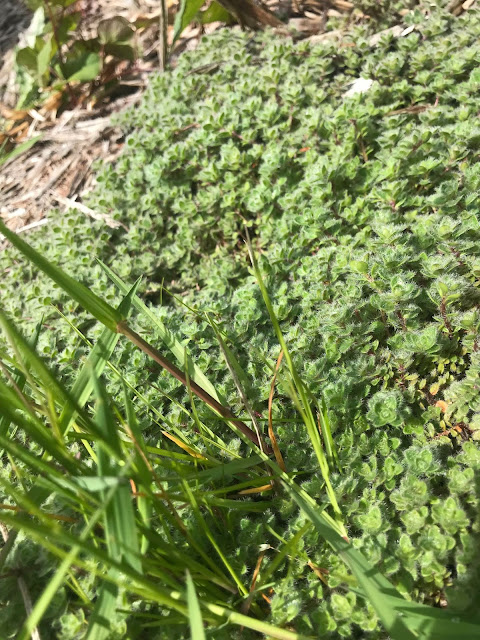What a beautiful and sunny first day at the UBC Orchard Garden! With the recent weather they’re calling “Mayvember” (the coldest May in 100 years!) I certainly had my doubts, but I actually may have I got my base-tan. Or maybe just a neck burn – I’ll start bringing sunscreen tomorrow (oops). Such a lovely start, and a beautiful way to officially close the doors on our practicums. While it was great to see some familiar faces again, I know we all miss those sweet kiddos we made connections with over the last 10 weeks, and honestly I can’t imagine a better transition back than a sunny day in the garden. My name is Amy, and today I will be joined by Gio as my blog partner.
The afternoon was spent working in the garden where we, the teacher candidates, were responsible for weeding, cutting back old growth, and other gardening tasks. Only a few of us had actual gardening experience, which makes for a great and diverse group of learners! We split into two groups: one group began weeding, and the other made little “fences” around garden areas using bamboo sticks and twine. While many of us had been raised thinking we have to weed every single weed out of gardens, one remarkable thing about the UBC Orchard Gardens is that they believe in the conservation of the “unplanned”. This means that we only removed weeds that were directly in the space of the plants purposefully planted, while allowing those outside that area to thrive all they want. Personally, I have next to zero expertise in gardening, and have only ever been instructed to remove like mad at the sight of any weed. This new concept, however, felt right. I’ll definitely be adopting this mentality some day, if I ever have my own garden. Oh! Another thing I’ll adopt is the idea of using creeping thyme as a lawn! Grass requires a lot more water, and people often use chemical fertiliser to keep it green. Creeping thyme, however, is soft, lush, and even edible. Plus, you don’t need to mow it! I wish every lawn looked like this. Check it out:(Photo: close up of creeping thyme)
Before we go on to reflect on our first-day experience, I have to share the best part of my day: we actually saw a coyote!! It came by so quietly to check us out that we didn’t notice it until one of our teammates saw it and clapped at it. Even though it was so adorable, it’s really important to keep the wildlife wild and not get them too accustomed to human interaction.
(Photo: our coyote friend running away. She got SO close to us! This was the fastest Gio could get his phone out) Hey all! Gio here. The afternoon work party was an opportunity for Amy and me to reflect on our experience through the lens of new teachers. One thing that stood out for us was the many philosophical and metaphysical elements of gardening. We noted that gardens were a metaphor for so much in life as was discussed with the larger group earlier in the day. One thing that grabbed my attention was when Chris said, “when removing weeds from the garden it is important to pull the whole root system, weeding partially will cause the unwanted plant to proliferate.” In reflection, I think that this can be a metaphor for the unwanted in our classrooms. For example, misconceptions in learning can run very deep. We want to uproot them entirely as opposed to a surface-level solution that will only serve to complicate future learning. This brought me back to a ‘preconceptions of Physics’ activity I did with one of my classes [link].

Similarly, it can serve as a metaphor for classroom behaviors and management strategies. We as teachers aim not simply to address a behavior but rather to get at the root causes. Addressing systemic factors is the best way to ensure future success.
As new teachers, another thing that stood out to us was how the garden brings so many disciplines together. Talking with others in the garden it became clear how garden-based learning was a culmination of science, art, sustainability, mathematics, and English, to name a few. This sort of interdisciplinary learning is so meaningful for students.
One thing that stood out to me was how the garden was such a fantastic venue for building the Core Competencies. The garden work party was a clear culmination of all three of the Core Competencies. Communication and collaboration were needed to assign tasks, explain expectations and work to get the job done. Thinking was evident from our discussions of what each plant was and how we might define weed. It was interesting to converse about how a word like weed could be subjective whereas a word like ‘invasive species’ takes on a more scientific meaning, and objective definition. Finally, the garden was a great place for exploring oneself, personally and socially. One thing that stood out to me was the opportunity to find my niche in the garden setting. Identifying our own strengths and weaknesses is an important part of education that sets students up to be productive citizens.
Bye for now!
-Amy & Gio




No comments:
Post a Comment